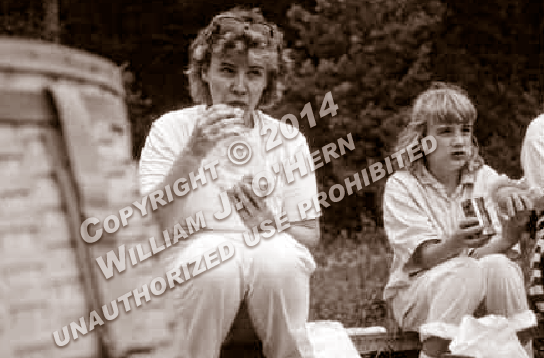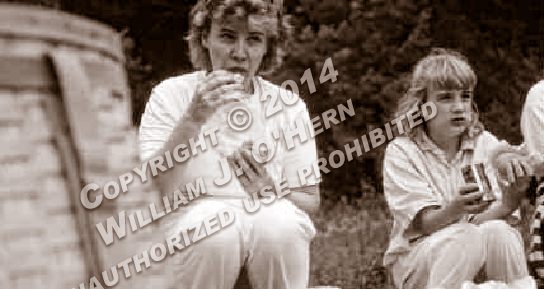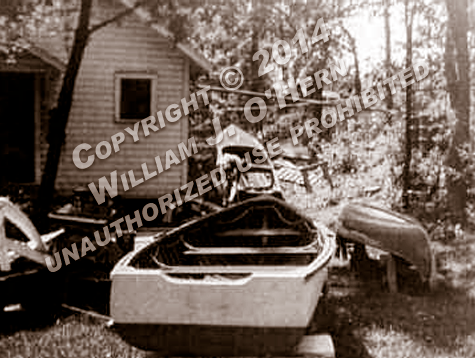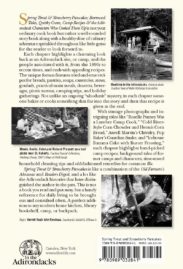Authors Note: I think of the freedom I enjoyed as a child at my once rural home and those times spent at Camp Oasis on the Seneca River.

Spring Trout and Strawberry Pancakes
Author’s Note
An excerpt from ” Spring Trout and Strawberry Pancakes “, Starting on page x.
I SHAKE MY HEAD in amazement when I think of the freedom I enjoyed as a child at my once rural home and those times spent at Camp Oasis on the Seneca River, my grandparents’ riverfront retreat. To this day I marvel at my parents’ and grandparents’ trust in my judgment and at the lack of restraint on my movement.
I grew up in what I’ve heard some city people call The Sticks—farms, expansive pastures, meadows and woodland—acres upon acres of undeveloped land. To me it was all wild beauty, a keystone of my youth. Like one friend and contributor to this work, Roy Wires, I grew up wild and free, often walking the fields in bare feet. There wasn’t a place I couldn’t go as long as I had a knapsack of food, a .22 rifle and a fishing pole. Roy and I played with cousins and friends who lived in the city, but there was always something about the urban setting that made us feel we didn’t fit in.
My connection to the countryside always reminded me of a certain Little Golden Book, The Country Mouse and the City Mouse. We’d rather have been catching box turtles and stalking the wild pheasants. The creeks were clear and the shoreline perfect for lounging after we piled up rocks to support our poles; all we needed to do was watch for the red and white bobber to dip below the surface of the water.
Today, our former country setting has heavily suffered the plight of sub- urban sprawl. Creeks are diverted through drainage culverts; housing developments have replaced meadows. There is a series of apartment houses where I once caught pollywogs, and now the nearby “Sherwood Forest” is not a forest at all, but a subdivision street that ends in a cul-de-sac.
I recall only a single warning about people I didn’t know. Don’t trust strangers. The majority of instructions regarding safety in my daily life and wanderings were about important matters like how to properly use a jack knife, a hatchet, a rowboat and later a boat powered by an outboard motor.

Bette and Kerry O’Hern enjoy a noontime break as the author tells an Adirondack tale.
Photograph by author
Many early childhood swimming instructions abounded. Living in proximity to a water world required me to learn how to swim well. Safety was of the utmost importance. I began swimming wearing the typical flotation device of the day—a ring of brightly colored balsa floats connected by a belt strapped around my waist. By the age of five or six I was swimming unaided. Being able to swim allowed me the privilege of taking the wooden row- boat out on the water alone. Grandpa was the manager of the Potter Boat Company. We always had a number of rowboats and motorboats moored by the docks. In 1957, I earned the privilege of taking a small motorboat beyond the boundaries of the river and into the lake. Demonstrating that I had learned proper boat safety was an important step. It meant I was allowed to go beyond sight of the dock, either up or down river.
Just six months shy of my twelfth birthday; I had demonstrated my proficiency with the 7½ horsepower Evinrude outboard motor. Up until that time I would be given permission to drive the small power boat only when an adult was with me. My exploring range expanded that year.
In most respects my grandparents were conventional camp owners, and in some ways they were not. Grandma arrived in America in 1896 at the age of five with her mother, father and two sisters. Her mother and father emigrated from England. My grandfather’s parents had also immigrated to this country from Switzerland, in 1895.
Grandma and Grandpa Zysset were in a motorcycle group. They enjoyed hill climbing. They also took long motorcycle trips throughout the North Country and the Adirondacks. They were handy. Grandpa was a carpenter, mechanic and jack of all trades; Grandma could rebuild a canoe, lay up a cobblestone wall, weave rugs out of rags and accomplish just about any other handicraft. She was also an excellent cook and baker. Their goal was to retire and live out their days at camp, where they would continue to raise the majority of their food. Camp Oasis’s setting and my parents’ rural home location proved to be the matrix that exposed me to the satisfaction that comes with work and to the joys of being outdoors.
Trees and plants, water and boats, dragonflies, butterflies, birds, frogs and turtles, Grandma’s yeast bread, listening to people who effortlessly told stories, and learning to appreciate all things in nature enriched my life. Lessons in using tools and inpracticality were also important. If there had been the array of entertaining electronic devices we have today, I wonder if I would have turned out the same.
I attribute the experiences of my youth to my appreciation of Adiron- dack history and my love of the Adirondack Park. Not wanting to neglect those mothers and grandmothers who baked wonderful dishes that are so different from today’s and those fathers and grandfathers who told grip- ping stories and supplied their families with income from logging, guiding, farming, carpentry and masonry, to name only a few of the occupations Adirondack folks relied on for their economic survival, I’ve woven this eclectic collection of profiles and tales, recipes and home cures, along with a vast number of early Adirondack camp photos.
Today’s sprawling suburban road systems make me more and more thankful for the visionaries who created the Adirondack Park. The whole pioneer life of the region is fascinating to me. The history of this and that Adirondack county, the guides and early settlers are etched in my bones — hard men and women, hard times, but fascinating social history.
Adirondack Spring Trout & Strawberry Pancakes: Camp Recipes, Quirky Cures and the Adirondack Characters Who Cook Them Up is my opportunity to tap into that lore — into the part of history that explores the not-so-common lives and ways of everyday Adirondack campers, something that has always been a fascination for me. Perhaps you will discover something amusing, useful or just plain interesting that you won’t find anywhere else.

Camp Oasis, June 1947. My grandparents worked on their camp for years to bring it up to its prime. Deer and rabbits were all over the place, and I slept in the attic with the sound of bull frogs calling from the swamp across the river.
Author’s Collection

